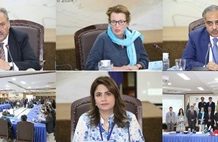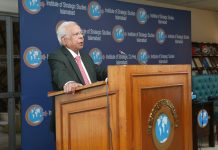SEMINAR ON “IMPLEMENTING PAKISTAN’S SOFT POWER”
Organized by Institute of Strategic Studies Islamabad
Statement by Mr. Sartaj Aziz
Adviser to the Prime Minister on Foreign Affairs
8 APRIL 2016
Honourable Ambassador (Retd) Masood Khan,
Distinguished Guests,
Ladies and Gentlemen.
I am delighted to be here today, at this prestigious forum; sharing my thoughts on a rather crucial topic that is not only of importance to Pakistan but also of importance to the countries which have suffered a lot in the past by the use of, or being affected by coercion.
But before I formally begin, I would like to congratulate the Institute of Strategic Studies Islamabad, for organizing this event. I am confident that our discussions here today would pave the way for an improved understanding of the concept of “Soft Power”, and the importance of its implementation for Pakistan.
Ladies and Gentlemen,
This is a well established fact that the term “Power” has been one of the most important notions in the International Relations, since the earliest political writings of eminent scholars like Machiavelli and Thucidydes. The concept, however, in my opinion, has not been understood properly. International Political actors have generally understood and used the power in its “Hard” form i.e that arising from military or economic power. The School of Realism, therefore, considers that the only test of “Power” could be “Strength for War”. Unfortunately, this concept has proved to be the cause of most devastating conflicts in the history of the world and has taken millions of innocent lives. In fact, I am of the view that this has also given rise to terrorism, insurgencies and other menaces of such kind. Armed groups and individuals have started to resort to the use of force for their illegal demands.
Ladies & gentlemen,
We can understand this concept of “Soft Power” as the use of national resources that can lead to a nation’s/group’s/organization’s ability to affect others through the co-optive means of framing the agenda, persuading, and eliciting positive attraction in order to obtain preferred outcome. In my opinion, the concept of “Soft Power”, although unveiled by Joseph Nye in the 90’s, has traditionally existed as a reality as well. The spread of Islam in the early days is a remarkable example of persuading others by the use of intangible sources like culture, morality, basic principles and values. So, soft power is more than influence, since influence can also rest on the hard power of threats or payments. And soft power is more than just persuasion or the ability to move people by argument, though that is an important part of it. It is also the ability to attract, and attraction often leads to acquiescence.
Soft Power has been used traditionally, both in isolation and also along-with the Hard Power, but the extent to which a balance is to be maintained between the two forms of power, is the real point to think about. In the recent decades, the revolution of electronic, print and social media has been effectively and widely used by different countries to mould public opinions. This has started a new trend of using soft power as a tool to use your resources in a manner, which are more likely to be accepted by the others. Let me clarify that although “Soft Power” is a reality today, but implementation of its tools does not guarantee absolute success and incredible power or authority as other states can render cultural resistance and non-acceptance of imposed norms, values and institutions. In other words, it’s not a comprehensive, one-size fits-all solution as there are limitations to its applications and effectiveness. But the same limitations exist with the Coercion/Hard power as well. Because, to be effective, coercive power rests on the target’s acquiescence. If I am willing to die rather than capitulate, the most sophisticated weapons and techniques become meaningless.
Hence the sentiments like “I would rather be a free man in my grave/than living as a puppet or a slave”, arise.
Hence, Ladies and Gentlemen, as I discussed earlier, the maintenance of balance between the Hard and the Soft Power, in accordance with your resources and limitations, holds the key to maintaining peaceful existence in international politics.
At this important era of globalization and emerging threats, Pakistan needs to develop and implement its “Soft Power” in order to get rid of most of its problems. This is a well established reality that Pakistan has suffered a lot because of its tarnished image. Let me admit that we do have many problems which brought us bad name but, we, unfortunately, have also been the target of false propaganda by some international actors. To counter this trend and to build a Brand and Narrative of Pakistan, we have to use this concept of Soft Power.
The real foundations of soft power are the rule of law and democratic institutions. The vitality of a nation does not come only from its economic progress and the size of its military, but also from its shared values, cultural heritage and social energy. As democracy is developing stronger roots in Pakistan; its image around the world is becoming more positive. Similarly, the progress we are making in strengthening the rule of law, the independence of the judiciary and the protection of human rights, will further strengthen Pakistan’s soft power.
Ladies & Gentlemen,
It gives me immense satisfaction to mention that the Foreign Office not only recognizes the importance of projecting soft power of Pakistan, but it has been using this tool to build a positive image of Pakistan in the rest of the world. There is a full-fledged division in the Ministry of Foreign Affairs which deals with the Public Diplomacy. This Division and our Missions abroad have done remarkably well to project a positive image of Pakistan in the world.
We have been trying to project the soft image of Pakistan by promoting its rich cultural heritage, music, cuisine, festivities, dress, sports, values and resilience of the people. Foreign Office has arranged Sufi music events, food festivals, cultural shows, truck art festivals and many other events both in Pakistan and in the rest of the world. Recently, Pakistan Day has been celebrated in the United Nations for the very first time. Similarly, Foreign Office has been organizing “Agha Shahi Lecture Series” in which intellectuals and professionals from different walks of life share their views and experiences with the officers of the Foreign Ministry. Foreign Office has also been trying to project Art works like calligraphy. Recently, masterpiece works of famous calligraphers has been compiled by the Foreign office in a single volume named “Allama bil Qalam”.
However, there is a need to do much more in this field. Thinkers and scholars like you have to share this responsibility. We all have to develop a brand of Pakistan which is currently unknown to the rest of the world. This will not only help in developing our soft power, but will also augment our “Hard Power”.
******













